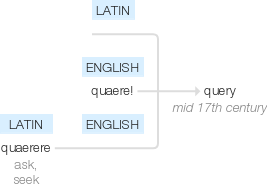Query
mid 17th century: anglicized form of the Latin imperative quaere!, used in the 16th century in English as a verb in the sense ‘inquire’ and as a noun meaning ‘query’, from Latin quaerere ‘ask, seek’.
wiktionary
An anglicisation of quere, an obsolete variant form of Latin quaere, second-person singular present active imperative of quaerō(“seek, look for; ask”). Cognate with French quérir, Italian chiedere, Portuguese querer, Romanian cere, and Spanish querer. Compare question.
etymonline
query (n.)
1530s, quaere "a question," from Latin quaere "to ask, inquire," "much used as a marginal note or memorandum to indicate a question or doubt, and hence taken as a noun" [Century Dictionary], second person singular imperative of quaerere "to seek, look for; strive, endeavor, strive to gain; ask, require, demand;" figuratively "seek mentally, seek to learn, make inquiry," probably ultimately from PIE root *kwo-, stem of relative and interrogative pronouns. Spelling Englished or altered c. 1600 by influence of inquiry. Compare quest.
Query stands for a question asked without force, a point about which one would like to be informed : the word is used with all degrees of weakness down to the mere expression of a doubt; as, I raised a query as to the strength of the bridge. [Century Dictionary]
query (v.)
"to question, ask questions; express doubt," 1650s, from query (n.). Intransitive sense is by 1680s. Related: Queried; querying.
